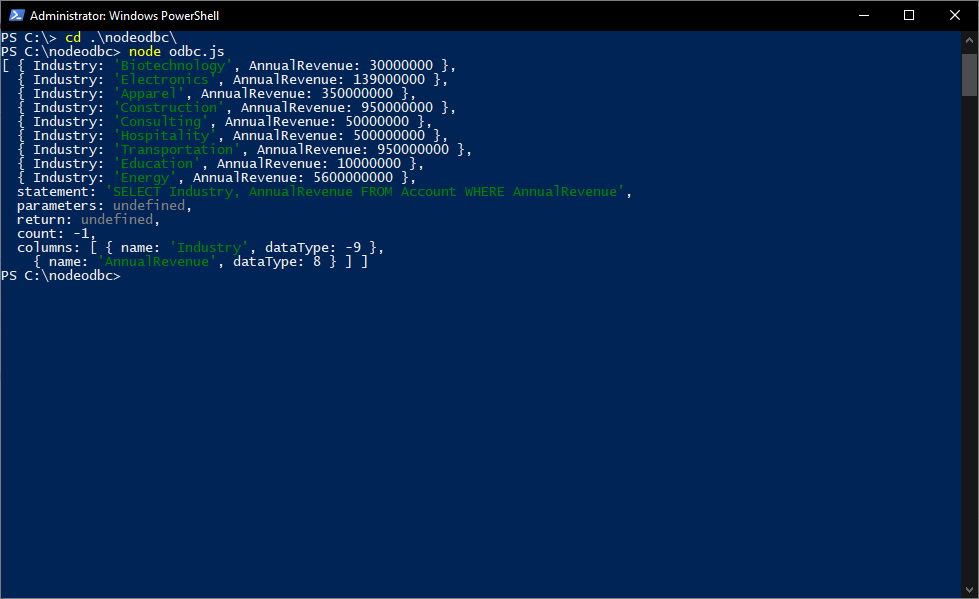Discover how a bimodal integration strategy can address the major data management challenges facing your organization today.
Get the Report →Query Clio Data through ODBC in Node.js
Use node-odbc to execute SQL queries against Clio data from Node.js.
Node.js is a JavaScript runtime environment that allows you to run JavaScript code outside of a browser. With the CData API Driver for ODBC, you can access live Clio data from Node.js apps and scripts. In this article, we walk through installing node-odbc and the required tools to create a simple Node.js app with access to live Clio data.
With built-in optimized data processing, the CData ODBC Driver offers unmatched performance for interacting with live Clio data in Node.js. When you issue complex SQL queries from Node.js to Clio, the driver pushes supported SQL operations, like filters and aggregations, directly to Clio and utilizes the embedded SQL engine to process unsupported operations client-side (often SQL functions and JOIN operations).
Connecting to Clio Data
If you have not already done so, provide values for the required connection properties in the data source name (DSN). You can use the built-in Microsoft ODBC Data Source Administrator to configure the DSN. This is also the last step of the driver installation. See the "Getting Started" chapter in the help documentation for a guide to using the Microsoft ODBC Data Source Administrator to create and configure a DSN.
Start by setting the Profile connection property to the location of the Clio Profile on disk (e.g. C:\profiles\Clio.apip). Next, set the ProfileSettings connection property to the connection string for Clio (see below).
Clio API Profile Settings
Clio uses OAuth-based authentication.
First, register an OAuth application with Clio. You can do so by logging to your Developer Account and clicking the Add button. Enter details and select the scope of your application here - these details will be shown to Clio users when they're asked to authorize your application. Your Oauth application will be assigned a client id (key) and a client secret (secret). Additionally you will need to set the Region in ProfileSettings connection property.
After setting the following connection properties, you are ready to connect:
- AuthScheme: Set this to OAuth.
- InitiateOAuth: Set this to GETANDREFRESH. You can use InitiateOAuth to manage the process to obtain the OAuthAccessToken.
- OAuthClientId: Set this to the client_id that is specified in you app settings.
- OAuthClientSecret: Set this to the client_secret that is specified in you app settings.
- CallbackURL: Set this to the Redirect URI that is specified in your app settings.
- Region: Set this in ProfileSettings to your Clio geographic region. Defaults to app.clio.com.
Building node-odbc
In order to connect to Clio through the CData ODBC Driver, you need to build node-odbc manually (after installing the required tools).
Installing the Required Tools
The following commands install the tools required to build node-odbc (note the -g parameter, which installs the tools globally).
npm i -g windows-build-tools npm i -g node-gyp
Building node-odbc
After installing the required tools, create a directory for the Node.js app and install odbc (which builds the binary for us to use in our Node.js script).
mkdir nodeodbc cd nodeodbc npm i -g node
Querying Clio from Node.js
With the ODBC Driver installed, a DSN Configured, and node-odbc built, we are ready to query live Clio data from a Node.js app. The sample code below connects to a specific DSN and queries the Bills table.
myscript.js
const odbc = require('odbc');
async function queryAPI() {
const connection = await odbc.connect(`DSN=CData API Source`);
const data = await connection.query('SELECT Id, Total FROM Bills');
console.log(data);
}
queryAPI();
Once you write the app, use node to execute the script:
node myscript.js

Download a free, 30-day trial of the CData API Driver for ODBC and start working with your live Clio data in Node.js. Reach out to our Support Team if you have any questions.






